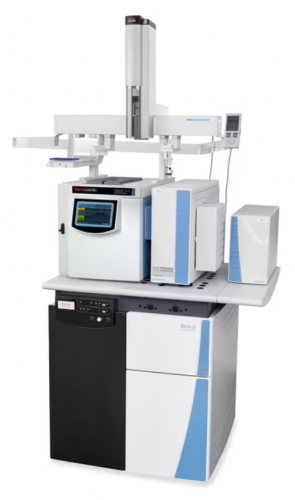

ThermoFisher Scientific GC IsoLink™ II IRMS System
By combining the separation power of gas chromatography with IRMS, the Thermo Scientific™ GC IsoLink™ II IRMS System provides high sensitivity and precision for isotope analysis of individual organic compounds.
The GC IsoLink II conversion unit continuously and quantitatively converts all organic compounds eluting from a GC column into simple gases (CO?, N?, H?, and CO) for high-precision IRMS analysis. It is built on holistic capillary design principles that maintain high resolution and enable maximal separation of constituent components of complex mixtures. With a proprietary modular design and plug-and-play injectors and detectors of the Thermo Scientific™ TRACE™ 1610 Gas Chromatograph, you can explore a multitude of configurations on the same GC system to meet the analytical challenges of today’s rapidly expanding isotope ratio applications.
GC IsoLink II IRMS System highlights
- Unique and fully automated combustion and high-temperature conversion unit for compound-specific analysis of 13C, 15N, 18O, and 2H
- Sharp peak shape and higher sensitivity by true capillary design
- The ultimate level of performance and versatility in GC-IRMS, including the hyphenation with a quadrupole MS
- Driven by Thermo Scientific™ Qtegra™ ISDS Software
Boost laboratory efficiency
The TRACE 1610 GC is the latest technological breakthrough conceived to maximize uptime and profitability. The TRACE 1610 GC features user-installable, plug-in Thermo Scientific™ iConnect™ Injector and Detector Modules, enabling easy cable- and tubing-free connections.
- Easily adapt the GC system configuration to your needs in minutes without special tools or training requirements with iConnect injector and detector modules
- Simplified troubleshooting operations through quick replacement of iConnect injector and detector modules, without the need for service calls
- Make capillary column installation quick and safe through tool-free Thermo Scientific™ iConnect Column Lock connectors
- Enhance operability by using the multi-functional icon-based touch screen ideal for local instrument control and method development
- Reduce operational costs with a GC system that allows the use of standard consumables
- Save energy with low thermal mass and a quick start-up
Combustion and High Temperature Conversion in parallel
The GC IsoLink II System offers a fully automated switch between the combustion and the High Temperature Conversion as the two heaters are mounted in parallel. Dead volume-free switching technology is driven by the Qtegra ISDS Software, ensuring that the optimal conditions of the reactor in standby are maintained without any loss in the GC-IRMS sensitivity.
- The combustion reactor (operating at 1,000 °C) provides optimal reactor conditions for achieving both complete oxidation and reduction, allowing the use of a single reactor for quantitative 13C and 15N analysis
- Quantitative high-temperature conversion at 1,420 °C is applied for hydrogen analysis and at 1,280 °C for oxygen isotope analysis
Capillary reactor design and connectivity
The capillary design of the reactors maintains high resolution and enables maximal separation of constituent components of complex mixtures. A deactivated capillary is attached to the reactors with a capillary solder joint, eliminating any risk of leakage at reactor entrance. The reactors supplied with the instrument can be easily connected with the Micro Channel Device (MCD), an all-metal-sealed GC connection with Ag-ferrules allow high-temperature GC applications. The MCD is easy to install and already leak-free when finger-tight. No wrench required.
Sample injection flexibility
The GC IsoLink II IRMS System can be operated using automation capabilities of Thermo Scientific™ TriPlus™ RSH SMART Autosampler or Thermo Scientific™ AI/AS 1610 Liquid Autosampler.
- The TriPlus RSH SMART Autosampler offers exceptional precision, flexibility, and productivity in robotic sample-handling solutions
- The AI/AS 1610 Liquid Autosampler is the best quality-to-price solution for budget-conscious laboratories performing high throughput and QA/QC analysis


